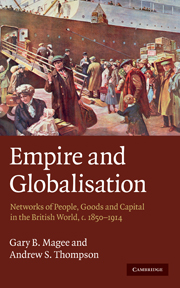Book contents
1 - Reconfiguring empire: the British World
Published online by Cambridge University Press: 05 June 2012
Summary
Introduction
The twenty-first century belatedly rediscovered empire. The forces of globalisation – with their apparent lack of respect for national borders – have propelled a remarkable revival of interest in our imperial past. Whether perceived as precursors to modern globalisation, or its ‘first wave’, empires are widely believed to hold the key to understanding globalisation's historical roots. As one leading scholar has aptly remarked, what were empires if not ‘transnational organisations … created to mobilise the resources of the world? Their existence and their unity were made possible by supra-national connections. Their longevity was determined by their ability to extend the reach and maintain the stability of these connections.’
This belief that trans-national impulses and ideas were intrinsic to the operations of empire, and had far-reaching historical consequences, goes a long way to explain why consideration of space and place has loomed so large in the ‘new’ imperial history. A ‘radical re-imagining of space and of human relationships to it’ was a concomitant of British expansion overseas. Spatial concepts of empire have, of course, long underpinned writing about Europe's imperial experiences, whether British, French, Dutch, Spanish or Portuguese. Yet it is only relatively recently, after almost half a century of neglect, that the empire's settler societies – those places where indigenous people were dispossessed, and where Europeans came to form a significant part of the population – have begun to be examined more explicitly, and indeed comparatively, by scholars of empire.
- Type
- Chapter
- Information
- Empire and GlobalisationNetworks of People, Goods and Capital in the British World, c.1850–1914, pp. 22 - 44Publisher: Cambridge University PressPrint publication year: 2010



